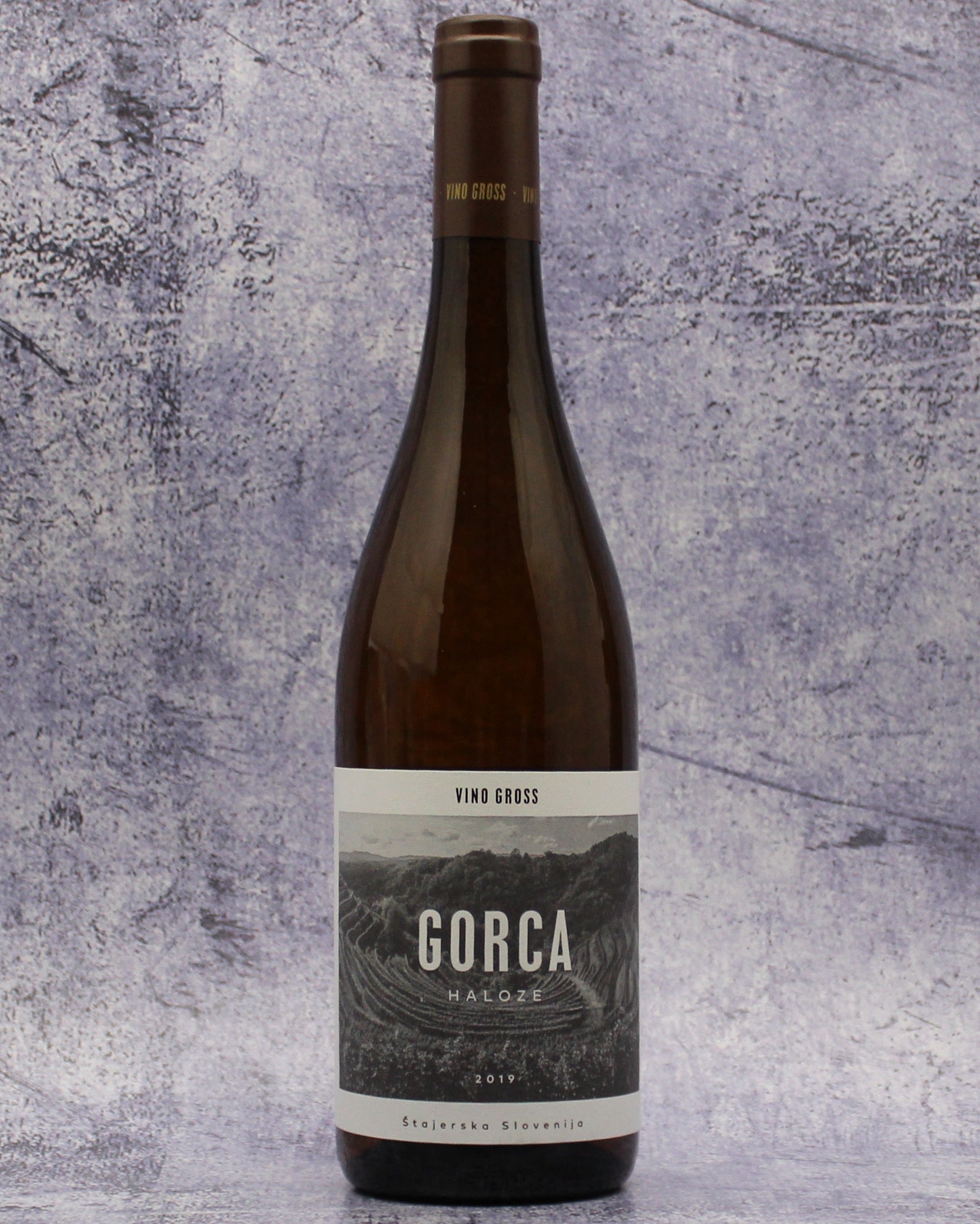Description
From: Gorca, Štajerska Slovenija, Slovenia
Varietal: Furmint
Tasting Notes & Critical Acclaim: Starting with aromatic notes of dried apricot, quince, and toasted almonds, layered with the zesty freshness of citrus zest and a hint of candied ginger. Floral elements like elderflower and apple blossom add a delicate fragrance and a touch of earthiness. The wine unfolds on the palate with a creamy body balanced by sharp, fresh acidity, leading to lively citrus, pineapple, and pomegranate flavors with a distinct salty minerality. The finish is long and complex, featuring the crispness of green apple, lemon, and grapefruit, softened by subtle tannins and a lingering note of herbal bitters. The wine’s bright acidity and high salinity, combined with its zesty, zingy character, is rounded off with a touch of vanilla cream and a hint of smoky minerality that adds depth and intrigue.
Via Official Producer Site: “Harmonic aroma of apple blossom, apple stem and subtle apricot. Citrus zest, mint and ripe quince round off the bouquet. Fresh acidity glides over the palate extending to an inciting lemon and apple aroma in the finish. Delicate tannins and lime dust complete the texture and round off the body.” Mathias Riepl, certified sommelier
Pairing: Traditional pairings include Slovenian seafood specialties like grilled branzino or salt-baked sea bass, where the wine's citrus notes and freshness complement the fish's natural flavors. It also pairs beautifully with roast chicken or duck, enhancing the dish's richness while balancing it with its zesty profile.
Beyond traditional fare, this wine shines alongside sushi, where its bright acidity cuts through the richness of fatty tuna or salmon. It’s also a great match for goat cheese salads, where the wine's floral and citrus notes amplify the greens' freshness and the cheese's tang. Try it with a lightly spiced Indian curry, where its minerality and acidity balance the heat and spices, or a Thai green papaya salad. Other great options include grilled asparagus with hollandaise, seared scallops with lemon butter, or a simple lemon-herb roasted chicken. Finally, pair it with a citrusy ceviche or a creamy risotto with spring vegetables, where the wine's acidity will lift the dish's richness.
Fish Stuffed With Herbs, Walnuts and Pomegranate Recipe
From Hanif Sadr
Adapted by Samin Nosrat
About. Michael and Maria Gross, the forces behind Vino Gross, have dedicated over a decade to uncovering the hidden potential of the Gorca region in Štajerska Slovenija. The story of Vino Gross is not just about winemaking; it's about legacy, discovery, and an unwavering belief in the land's ability to produce exceptional wines. Michael Gross, a fifth-generation winemaker, continues the proud family tradition with a new chapter across the border from their home in Ratsch, Austria, into Slovenia's fertile wine- growing areas.
The Gross family has deep roots in winemaking, tracing their farming history to the mid-18th century. It was in 1907 that Heinrich Gross purchased a vineyard in the Witscheiner Herrenberg, then part of Austria and now Slovenia, which marked the beginning of the family’s viticultural history. By the early 1980s, Michael’s father, Alois Gross, had focused on enhancing their wines' quality, earning a reputation as a pioneer in the region. However, a fortuitous letter in 2004 brought the Gross family to Gorca, Slovenia. An elderly woman offered Alois the chance to purchase a small house and vineyard, a “sleeping beauty,” as it were, “waiting to be awakened.” Though initially hesitant, the family soon realized the immense potential of this land, with its climate, soils, and varieties mirroring those of Ratsch. By 2011, Vino Gross was established, with Michael and Maria taking full responsibility for the estate by 2019.
Michael and Maria Gross approach their work in Gorca with respect for tradition and a commitment to innovation. Michael, whose love for wine began at the age of 14, was influenced by his exposure to the great wines of Burgundy, Bordeaux, and Piedmont, thanks to his parents. After studying at the University of Natural Resources and Life Sciences in Vienna and gaining experience in prestigious wine regions such as Wachau, Oregon, Croatia, and Bosnia-Herzegovina, Michael returned to his roots. Together with Maria, they have embraced the challenge of making wines that reflect the unique terroir
of Gorca and Colles. “If you are lucky, you have great terroir. After ten years, I can tell you: we are very lucky,” Michael proudly asserts.
The vineyards of Gorca are situated at an altitude of about 300 meters, surrounded by steep, bowl-shaped terraces that capture and retain heat, creating a unique microclimate. Influenced by the Alps and the Adriatic Sea, the climate here is marked by warm days, cool nights, and significantly less rainfall than in Ratsch. These conditions are ideal for the aromatic white varieties that thrive on the calcareous clay soils known locally as opok. This terroir is unforgiving, with sparse topsoil that forces the vines to root deeply, resulting in wines that are lean, salty, and possess a long, elegant finish.
Gorca, a historic wine-growing town, hosts the ideal conditions for cultivating the Furmint grape variety. In the town’s hills are three vineyards dedicated to this sensitive grape, known for its extremely thin, slightly perforated skin that makes it highly susceptible to weather conditions, often rendering harvests impossible in some years.
However, with the acquisition of clones from old Slovenian vines, these vineyards are poised to produce Furmint of the highest quality. The grapes flourish on the steep, south-facing terraces of the single vineyard site Gorca, where the heat-retentive basins play a crucial role in developing the vines.
Michael and Maria are committed to organic farming, eschewing herbicides, insecticides, and chemical fertilizers in favor of compost and meticulous manual labor. Each year, they adapt their vineyard practices to the specific needs of the vintage, always striving for balance. Harvesting is done entirely by hand, with a yield of about 1 to 1.5 kilograms per vine, ensuring that only the healthiest grapes make it to the winery.
Michael describes their approach in the cellar as “controlled idleness,” a philosophy that embraces gentle handling and minimal intervention. The wines undergo natural fermentation in large oak barrels, ranging from 600 to 2,800 liters, and are left on the lees for a year. Malolactic fermentation occurs naturally, after which the wines are lightly sulfurized and left to mature further in stainless steel tanks. No fining or filtration is applied, preserving the integrity of the wine. Michael firmly believes in the age-ability of his wines, reserving about 10% of each vintage to prove their potential for long-term development.
Michael and Maria Gross have transformed Vino Gross into a forerunner of quality in Štajerska Slovenija. In Michael’s words, “We have the once-in-a-lifetime chance to build up a region from the beginning.” And with each bottle of Vino Gross, they are doing just that—reviving a sleeping beauty and sharing the fruits of their labor with the world.
Wine Notes: The soil, a unique blend of silty loam and limy clay marl (opok), further contributes to the wine’s distinctive character. Located at elevations between 330 and 390 meters above sea level, these vineyards produce Furmint with large-lobed leaves and loose, late-ripening grape clusters. After a meticulous process of spontaneous fermentation, the wine matures for ten months in large, used wooden barrels, followed by an additional four months in steel tanks. This unfiltered wine pairs beautifully with fish, poultry, and warm starters and is best enjoyed between 2022 and 2029. The age of the vines, ranging from 12 to 65 years, adds depth and complexity to this exceptional wine.
Via Importer Site: After Welschriesling (Laški Rizling), Furmint is the second-most planted grape variety in Slovenia. It is also known as Šipon, a variety that has been taken to great fame in Hungary with its famous sweet wines from Tokaji. In 2008 Johannes and Michael Gross paid a visit to István Szepsy, the pioneer of dry Furmint, in order to buy a selection of his best grape vines. They bred the vines and planted them on the terraces in Gorca. The wine now includes these vines in addition to older vines averaging 65 years in age. The wine is pressed whole cluster and spontaneously fermented in 2600 L oak. Elevage continues for 12 months in oak, followed by 3 months in stainless before bottling.

